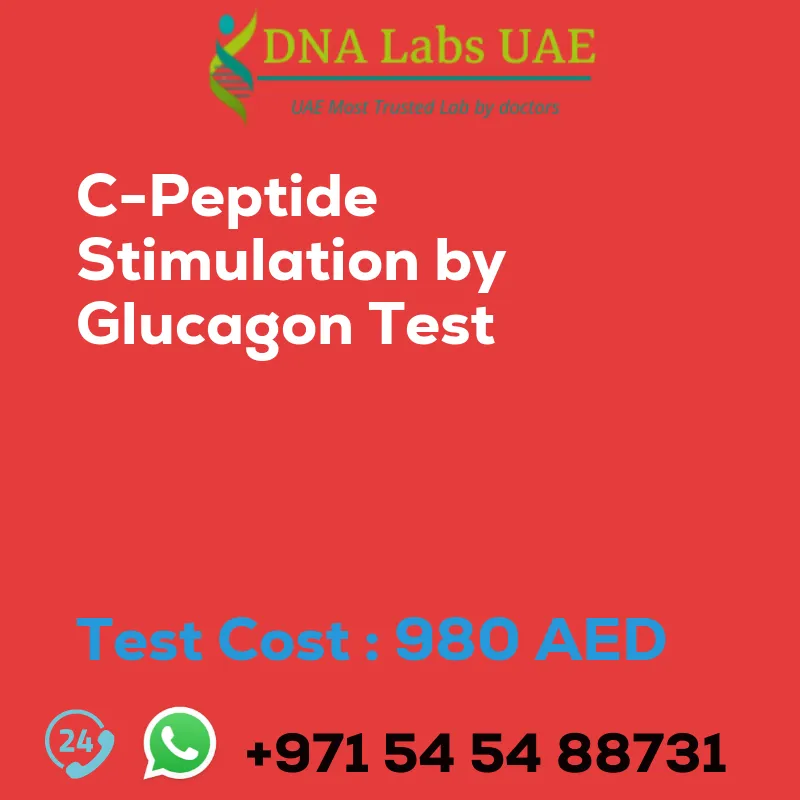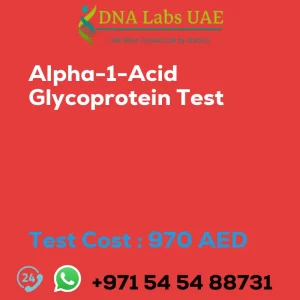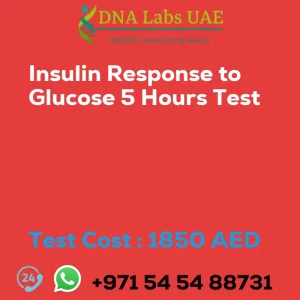C-Peptide Stimulation by Glucagon Test Price 980 AED
Decoding Diabetes: Grasping the C-Peptide Stimulation Test in the UAE
Diabetes is a persistent ailment impacting millions worldwide, and the UAE is no stranger to it. If you’ve been identified with diabetes or believe you may have it, comprehending your insulin production is essential. The C-Peptide Stimulation by Glucagon Test can be an instrumental resource for your doctor to evaluate your insulin function and devise the optimal treatment strategy.
Insulin and C-Peptide Explained
Insulin, a hormone synthesized by the pancreas, is crucial in maintaining blood sugar levels. When you consume food, insulin aids your body in absorbing glucose (sugar) from the bloodstream and delivering it to your cells for energy. The C-peptide is a natural byproduct discharged concurrently with insulin during its synthesis.
What Constitutes the C-Peptide Stimulation by Glucagon Test?
This specialized blood examination gauges your body’s capacity to generate insulin in response to a stimulus. Here’s the procedure:
- Initial Blood Draw: A healthcare professional will initially draw a blood sample to gauge your fasting blood sugar and baseline C-peptide levels.
- Glucagon Injection: A hormone known as glucagon is subsequently injected, which naturally prompts the pancreas to discharge insulin.
- Post-Stimulation Blood Draw: After a specific time interval (typically 30 or 60 minutes), another blood sample is drawn to gauge your C-peptide levels once more.
How Does the Test Assist in Diagnosing Diabetes?
By contrasting your baseline and post-glucagon stimulation C-peptide levels, the doctor can evaluate your body’s insulin production capability.
- Normal Results: A substantial increase in C-peptide levels post-glucagon stimulation indicates your pancreas is functioning properly and generating adequate insulin.
- Low Results: Minimal or no increase in C-peptide levels may suggest insufficient insulin production, potentially indicating type 1 diabetes.
Advantages of the C-Peptide Stimulation Test:
- Precise Evaluation: Offers valuable insights into your body’s insulin response, aiding in precise diabetes diagnosis and distinguishing between type 1 and type 2 diabetes.
- Treatment Monitoring: Can be employed to monitor the efficacy of insulin therapy in managing diabetes.
- Early Detection: May assist in identifying potential future complications associated with diabetes.
Who Stands to Gain from the C-Peptide Stimulation Test?
This test might be suggested by your doctor in the UAE if you exhibit:
- Symptoms indicative of diabetes, such as excessive thirst, frequent urination, unexplained weight loss, or blurred vision.
- A family history of diabetes.
- Risk factors for developing diabetes, such as obesity or prediabetes.
What to Anticipate During the Test?
The C-Peptide Stimulation Test is a relatively straightforward outpatient procedure. You may experience minor discomfort from the blood draws and the glucagon injection. It’s crucial to adhere to any specific instructions provided by your doctor regarding fasting or medication intake prior to the test.
Managing Your Diabetes Effectively
If you’re apprehensive about your diabetes diagnosis or insulin function, discussing the C-Peptide Stimulation Test with your doctor in the UAE can be a vital step. Early diagnosis and appropriate management of diabetes are crucial for preventing long-term complications and fostering overall well-being. By collaborating with your healthcare team, you can effectively manage your diabetes and lead a healthy life.
Test Details:
The C-peptide stimulation by glucagon test is a diagnostic test used to evaluate the function of the beta cells in the pancreas. Beta cells are responsible for producing insulin, and C-peptide is a byproduct of insulin production. During the test, the patient is given an injection of glucagon, a hormone that stimulates the release of insulin from the beta cells. Blood samples are then taken at specific time intervals to measure the levels of C-peptide in the blood.
The test is typically performed in individuals with diabetes to determine if they are producing an adequate amount of insulin. If the C-peptide levels increase significantly after the glucagon injection, it indicates that the beta cells are functioning properly and producing insulin.
The C-peptide stimulation by glucagon test can help differentiate between type 1 and type 2 diabetes. In type 1 diabetes, the beta cells are destroyed and do not produce insulin, resulting in low C-peptide levels. In type 2 diabetes, the beta cells may still be functional, but insulin resistance leads to elevated blood glucose levels.
The test can help determine the underlying cause of diabetes and guide treatment decisions. It is important to note that the C-peptide stimulation by glucagon test should be performed under the supervision of a healthcare professional and is not suitable for all individuals. It may not be appropriate for individuals with certain medical conditions or those taking specific medications.
Additionally, the test results should be interpreted in conjunction with other clinical and laboratory findings to make an accurate diagnosis.
Test cost: 980.0 AED
Symptoms, Diagnosis, and Referring Details:
Test Name: C-PEPTIDE STIMULATION BY GLUCAGON Test
Components: Price: 980.0 AED
Sample Condition: 2 mL (0.5 mL min.) serum from 1 SST for each timed specimen. Draw baseline fasting specimen. Administer 1 mg Glucagon I.V. Draw additional specimens at 5, 10, and 15 minutes post-Glucagon. Note time drawn on each container label and test request form. 12 hours overnight fasting mandatory. Ship refrigerated or frozen.
Report Delivery: Daily
Method: Chemiluminescent Immunoassay
Test Type: Diabetes
Doctor: Endocrinologist, Physician
Test Department:
Pre Test Information: 12 hours overnight fasting mandatory. Injection Glucagon is not supplied by LPL.
| Test Name | C-PEPTIDE STIMULATION BY GLUCAGON Test |
|---|---|
| Components | |
| Price | 980.0 AED |
| Sample Condition | 2 mL (0.5 mL min.) serum from 1 SST for each timed specimen.Draw baseline fasting specimen. Administer 1 mg Glucagon I.V. Draw additional specimens at 5, 10 and 15 minutes post-Glucagon. Note time drawn on each container label and test request form. 12 hours overnight fasting mandatory. Ship refrigerated or frozen. |
| Report Delivery | Daily |
| Method | Chemiluminescent Immunoassay |
| Test type | Diabetes |
| Doctor | Endocrinologist, Physician |
| Test Department: | |
| Pre Test Information | 12 hours overnight fasting mandatory. Injection Glucagon is not supplied by LPL. |
| Test Details | The C-peptide stimulation by glucagon test is a diagnostic test used to evaluate the function of the beta cells in the pancreas. Beta cells are responsible for producing insulin, and C-peptide is a byproduct of insulin production.
During the test, the patient is given an injection of glucagon, a hormone that stimulates the release of insulin from the beta cells. Blood samples are then taken at specific time intervals to measure the levels of C-peptide in the blood. The test is typically performed in individuals with diabetes to determine if they are producing an adequate amount of insulin. If the C-peptide levels increase significantly after the glucagon injection, it indicates that the beta cells are functioning properly and producing insulin. The C-peptide stimulation by glucagon test can help differentiate between type 1 and type 2 diabetes. In type 1 diabetes, the beta cells are destroyed and do not produce insulin, resulting in low C-peptide levels. In type 2 diabetes, the beta cells may still be functional, but insulin resistance leads to elevated blood glucose levels. The test can help determine the underlying cause of diabetes and guide treatment decisions. It is important to note that the C-peptide stimulation by glucagon test should be performed under the supervision of a healthcare professional and is not suitable for all individuals. It may not be appropriate for individuals with certain medical conditions or those taking specific medications. Additionally, the test results should be interpreted in conjunction with other clinical and laboratory findings to make an accurate diagnosis. |







